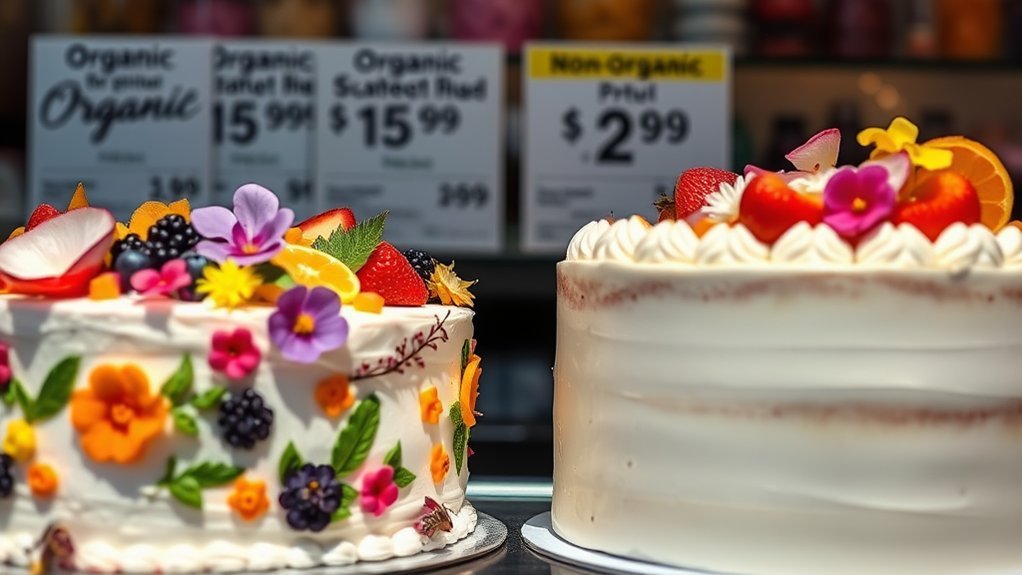Organic Vs Non-Organic Cakes: What’S the Real Difference?
When comparing organic and non-organic cakes, the key difference lies in the ingredients. Organic cakes are made without synthetic fertilisers, pesticides, or genetically modified organisms (GMOs). This often means they contain more nutrients and antioxidants, which can be beneficial for your health.
Moreover, organic baking practices ensure a cleaner and safer product, minimising harmful bacteria. From an environmental perspective, organic farming promotes biodiversity, which is essential for a healthy ecosystem.
While organic cakes may be pricier, the health benefits and positive impact on the environment make them worth considering. Explore these differences to make an informed choice!
Key Takeaways
- Organic cakes are made with ingredients that are free from synthetic fertilisers, pesticides, and GMOs, offering healthier choices for consumers.
- They typically contain higher levels of nutrients and antioxidants, thanks to superior soil quality and farming methods.
- Organic baking adheres to strict hygiene standards, ensuring cleaner and safer food products.
- The environmental benefits of organic farming include greater biodiversity and reduced chemical pollution, which supports healthier ecosystems.
- The price of organic cakes can vary due to increased demand and challenges in the supply chain, which may affect their affordability.
Understanding Organic Ingredients

When selecting organic ingredients, it’s important to grasp the regulations surrounding their production. Organic foods must be free from synthetic fertilizers and pesticides, and they can’t contain genetically modified organisms (GMOs). To qualify as organic, at least 95% of the ingredients must adhere to these standards. This influences how you source your ingredients, as the process emphasizes ecological balance and resource recycling. Consumer preferences are increasingly leaning towards organic products, driven by a desire for healthier and more environmentally friendly options. Additionally, organic ingredients may lower the risk of chronic diseases, which is a significant factor for health-conscious consumers. However, it’s worth noting that organic goods generally come with a higher price tag and may have a shorter shelf life. Additionally, organic foods typically have lower pesticide residues compared to conventional foods, which can be a significant factor for health-conscious consumers.
Nutritional Differences Between Organic and Non-Organic Cakes

Both organic and non-organic cakes can satisfy your sweet cravings, but there are notable nutritional differences.
Organic cakes often have greater nutrient variability due to soil quality and farming methods. They typically contain higher levels of antioxidants, which may help in disease prevention and overall health. Additionally, organic cakes frequently use whole grains, increasing dietary fibre, which aids digestion and keeps you feeling full. Moreover, organic ingredients usually have lower levels of cadmium, reducing your exposure to this harmful metal. The mineral content in organic cakes can also vary more because of different soil management techniques. Furthermore, organic farming practices promote ecological balance, which can positively impact the nutritional quality of the ingredients used in these cakes. This is because organic ingredients ensure freedom from synthetic pesticides and fertilizers, enhancing their overall health benefits.
In short, opting for organic can provide a wider range of nutrients that are beneficial for you and your loved ones.
Safety and Cleanliness in Organic Baking

Organic cakes not only enhance nutritional value but also prioritise safety and cleanliness in the baking process.
Organic bakeries follow strict sanitation protocols and undergo regular inspections to ensure high hygiene standards. They use non-chemical cleaning products, steering clear of harmful residues commonly found in traditional baking. Additionally, sanitation standards set by the Canadian Food Inspection Agency (CFIA) guide their practices to maintain food safety. Suppliers of organic ingredients are often required to adhere to certification standards, ensuring that all products meet rigorous quality and safety benchmarks.
Effective pathogen control is vital; organic facilities maintain rigorous cleaning and drying procedures to reduce bacterial growth. Staff receive thorough training in sanitation practices, fostering a culture of safety.
Additionally, organic bakeries manage humidity and temperature effectively, further protecting food quality.
Environmental Impact of Organic Farming

Organic farming has a significant positive impact on the environment by promoting sustainable practices that benefit ecosystems and human health. By reducing the use of chemical fertilisers, organic methods help lower greenhouse gas emissions and improve soil carbon storage. This approach encourages biodiversity, allowing beneficial organisms to flourish, which aids in nutrient cycling and natural pest control.
Moreover, organic farming enhances water conservation through improved soil structure, leading to better water retention and filtration. With minimal pollution from synthetic pesticides, organic methods contribute to healthier landscapes.
Economic Factors Influencing Organic Cake Prices

As demand for organic cakes increases, several economic factors impact their prices. Growing consumer interest in healthier options drives this demand, but supply chain disruptions can raise ingredient costs, such as flour and sugar.
Price fluctuations in raw materials, often influenced by geopolitical events, add another layer of complexity. The organic food sector is projected to reach £320 billion by 2025, highlighting significant market growth.
However, bakers must navigate challenges in maintaining profitability while offering competitive prices. Pressures from the labour market and the need to differentiate products through quality and sustainability also contribute to price variability.
Understanding these factors sheds light on the true cost of organic cakes in today’s market.
Frequently Asked Questions
Are Organic Cakes Gluten-Free?
Organic cakes can be gluten-free if they are made with gluten-free ingredients, but not all organic cakes are suitable for those avoiding gluten. To ensure they’re safe for gluten-sensitive individuals, look for organic certification, which indicates the use of quality ingredients.
Can I Find Organic Cake Mixes in Stores?
Imagine a bright aisle lined with appealing boxes; you’ll discover organic cake brands such as European Gourmet Bakery and Arrowhead Mills. These mixes are easily found in specialist grocery stores, making it simple to bake a healthier treat.
How Long Do Organic Cakes Last?
Organic cakes generally have a shorter shelf life compared to traditional cakes, lasting around 1 to 5 days if stored correctly. Their freshness is influenced by how you store them and the specific ingredients used. For example, a cake made with fresh fruit might spoil faster than one made with just flour and sugar. To keep your organic cake fresh, store it in an airtight container in a cool, dry place.
Are There Vegan Organic Cake Options Available?
Certainly, there are plenty of vegan organic cake options available. These cakes come in various flavours, using ingredients like almond milk and natural sweeteners that are not only tasty but also healthier. They cater to a wide range of preferences, making them a great choice for everyone.
Can I Customize Organic Cake Orders?
Yes, you can customise organic cake orders. You can select your own flavours and benefit from carefully sourced ingredients, ensuring high quality. Working closely with bakers allows you to design cakes that meet your specific preferences and dietary requirements.
Conclusion
When choosing between organic and non-organic cakes, it’s important to know the key differences. Organic cakes typically feature higher-quality ingredients and have less impact on the environment. However, your choice will ultimately depend on your values, taste preferences, and budget. For example, if you care about sustainability, you might lean towards organic options, but if you’re simply after a delicious treat, non-organic cakes can be just as enjoyable. As you enjoy your next slice, think about what you’re eating and how it aligns with your beliefs.







